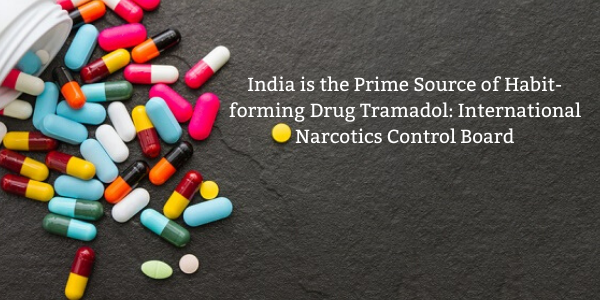
India is the Prime Source of Habit-forming Drug Tramadol: International Narcotics Control Board

A report by the International Narcotics Control Board says that India has turned out to be the prime source of ‘Tramadol’, a trafficked, substandard or illicitly manufactured drug that is seized worldwide. Tramadol is an opioid-based painkiller used as a narcotic substance.
According to the 2019 report released by the United Nations Office on Drugs and Crime(UNODC), available data suggest that in recent years, India has emerged as the centre of manufacturing of Tramadol destined for clandestine markets.
Available data indicate that India was the source of 87 per cent of the Tramadol seized in Ghana in 2017. The report also blames India for illegally supplying drugs to many countries. However, there has been a difference since April 2018, after India placed tramadol among nationally controlled substances under the Narcotic Drugs and Psychotropic Substances (NDPS) Act, 1985.
“Following the changes in control measures in India, experts in Ghana and Nigeria noted a significant decline in large seizures of tramadol and a corresponding increase in prices for tramadol tablets in the illicit market,” states the report.
Not only this but also the UN body also noted that “trafficking in heroin is also a growing problem in countries on the coast of the Indian Ocean”. According to its report, Illicit cultivation of cannabis continues to be a challenge for law enforcement agencies in South Asia, in particular in India.
The report had also added that India is among the countries worldwide with the greatest extent of illicit cannabis cultivation, citing the data from 2010 to 2017. As per the report, the seizures of amphetamine-type stimulants (ATS) peaked, at 931 kg, in India in 2018. ATS is the group of drugs whose principal members include amphetamine and methamphetamine.
The report also hails India’s efforts as “the only country in the subregion that has consistently reported eradication of illicit opium poppy cultivation”. Despite an increase in illicit cannabis cultivation and the amount of production, “Indian drug enforcement authorities eradicated 1,980 hectares of illicit cannabis cultivation in 2018, which was substantially less than the 3,446 hectares of eradication in 2017,” the report said.
The report also criticizes India for not submitting the statistical report. In 2019, about 86 per cent of the countries that submitted form P for 2018 did so by the deadline of 30 June 2019. Form P is an annual statistics report on the manufacture, trade, and consumption of substances controlled under the Convention on Psychotropic Substances of 1971. Among those nations that failed to submit report was India.
Source: The Print, Manorama.